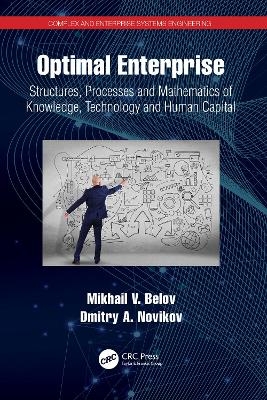
Optimal Enterprise
CRC Press (Verlag)
978-0-367-65243-2 (ISBN)
In the modern world, most gross product is created within Enterprise firms, project programs, state agencies, transnational corporations and their divisions, as well as various associations and compositions of the above entities. Enterprises, being, on the one hand, complex, and, on the other hand, widespread systems, are the subject matter of cybernetics, system theory, operations research, management sciences and many other fields of knowledge.
However, the complexity of the system obstructs the development of mathematically rigorous foundations for Enterprise control. Moreover, methods of operations research and related sciences, which are widely used in practice, provide optimization of the constituents of an Enterprise, without modeling it as a whole system. But the optimization of parts does not lead to the optimality of the whole, and, also, the absence of top-down and holistic mathematical models of Enterprise contradicts the principle of holism and the system approach.
The approach in this book looks first at Enterprise Systems and their essential aspects as complex sociotechnical systems composed of integrated sets of structural and process models (Chapters 1 and 2). A uniform description of all the heterogeneous fields of the modern Enterprise (marketing, sales, manufacturing, HR, finance, etc.) is then made, and the Enterprise Control Problem is posed as a top-down and holistic mathematical optimization problem (Chapter 3). Original models and methods of contract theory (Chapter 4), technology management (Chapter 5), human behavior and human capital (Chapter 6) and complex activity and resource planning (Chapter 7) are developed to solve the problem. Structural processes and mathematical models constitute an Optimal Enterprise Control Framework (Chapter 8) that provides a practical solution to the Enterprise Control Problem.
This book is a resource for postgraduate and doctoral students, postdoctoral researchers and professors with research interests in the following fields of science:
Fundamental Complex Systems study, Complex Systems Engineering, Enterprise Systems Engineering
Applications of Operations Research, Optimization, Probability and Stochastic processes to Management Science, Economics and Business
Theory of the Firm
Business and Management – general, strategy/leadership, organization management, operations management and management information systems
Theory of Business Processes, Business Processes Improvement and Reengineering
Mikhail Belov is Deputy CEO of IBS, responsible for new technology and business development in the area of engineering IT systems, PLM and other industrial IT systems. His 38-year career has centered on systems engineering, operations research, economics and finance, IT, electronics. Mikhail was Vice-President of Metrosvyaz, Deputy Finance Director of TOKOBANK, and President & Owner of Geliosoft Consulting, a startup company focused on cutting-edge technologies, such as an ultra-wideband multi-radar system. Mikhail holds an MS in electronics from Moscow Engineering Physics Institute and a PhD in operations research and applied math statistics from the Central Scientific Research Institute. Doctor of Science (Techn.), he also holds an MBA in finance. Dmitry Novikov is director of Institute of Control Sciences of Russian Academy of Sciences. His scientific interests cover: Control Theory, Cybernetics, Game Theory, Decision-making, Collective Behavior. More than 500 publications (see the full publication history), including more than 20 monographs (Springer, CRC, etc), textbooks and brochures; more than 100 papers in leading journals. He has more than 25 year’s extensive experience in the field of scientific and technological projects and company management (manufacturing sphere, research, teaching, consulting). Dmitry is Doctor of Science (Techn.), Professor, Corresponding member of Russian Academy of Sciences, Head of Control Sciences Department of Moscow Institute of Physics and Technology
Part I. Methodology. Foundations of Enterprise Control
Chapter 1 Enterprise and Complex Activity. Qualitative models
1.1 Introduction
1.2 Structural models of complex activity and Enterprise
1.3 Uncertainty and creation of elements of complex activity
1.4 Lifecycles of complex activity
1.5 Implementation of the management processes
1.6 Conclusion
References
Chapter 2 Enterprise management and lifecycles compatibility
2.1 A sociotechnical system, complex activity, and purposefulness
2.2 Subject matter of Enterprise management
2.3 Means of and factors involved in Enterprise management
2.4 Ordering of management actions along the lifecycle of complex activity
2.5 Compatibility of complex activity lifecycles
2.6 Conclusion
References
Part II. Mathematics. Mathematical models and methods of Enterprise Control
Chapter 3 Enterprise Control Problem – the Statement
3.1 Concept of optimization
3.2 Enterprise Control Problem – qualitative model
3.3 Enterprise Control Problem among related knowledge domains
3.4 Enterprise Control Problem as an optimization problem
3.5 Conclusion
References
Chapter 4 Contracts
4.1 Static principal – agent models
4.2 Static multi-agent models
4.3 Dynamic multi-agent models
4.4 Conclusion
References
Chapter 5 Technology
5.1 Technology management problem
5.2 Known models and methods in related scientific domains
5.3 Technology evolution and management
5.4 Integration of technology components
5.5 Technology in an external environment
5.6 Conclusion
Appendixes
References
Chapter 6 Human capital
6.1 Problem of human capital management
6.2 Pools of active resources as a formal representation of human capital
6.3 Statistics of the active resource traffic
6.4 Conclusion
Appendixes
References
Chapter 7 Planning
7.1 Algorithmic models of planning process in hierarchical dynamic multi-agent active system
7.2 Planning of transition from design phase to execution phase in dynamic active system
7.3 Planning and control in dynamic multi-agent active system with changing characteristics
7.4 Planning of Human Capital
7.5 Conclusion
Appendixes
References
Part III. Practice. Business Tools and Applications
Chapter 8 Optimal Enterprise Control Framework and Practical Implementation
8.1 Optimal Enterprise Control Framework
8.2 Some applications of contracts
8.3 Practical technology development optimization
8.4 Optimal planning in practice
8.5 Conclusion
Appendixes
References
Afterword
Subject Index
| Erscheinungsdatum | 07.05.2021 |
|---|---|
| Reihe/Serie | Complex and Enterprise Systems Engineering |
| Zusatzinfo | 31 Tables, black and white; 100 Illustrations, black and white |
| Verlagsort | London |
| Sprache | englisch |
| Maße | 156 x 234 mm |
| Gewicht | 644 g |
| Themenwelt | Mathematik / Informatik ► Informatik ► Theorie / Studium |
| Mathematik / Informatik ► Mathematik | |
| Recht / Steuern ► Privatrecht / Bürgerliches Recht ► IT-Recht | |
| Technik ► Umwelttechnik / Biotechnologie | |
| Wirtschaft ► Betriebswirtschaft / Management | |
| Wirtschaft ► Volkswirtschaftslehre | |
| ISBN-10 | 0-367-65243-9 / 0367652439 |
| ISBN-13 | 978-0-367-65243-2 / 9780367652432 |
| Zustand | Neuware |
| Informationen gemäß Produktsicherheitsverordnung (GPSR) | |
| Haben Sie eine Frage zum Produkt? |
aus dem Bereich


